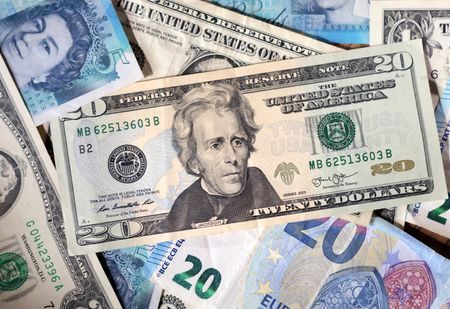By Lucy Raitano and Rocky Swift
TOKYO (Reuters) -The dollar slipped again on Tuesday after declining for a week, weighed down by the Federal Reserve’s caution over the economy while traders considered news that upcoming U.S.-Japan talks could include discussions on FX and avoiding volatility.
The greenback sold off broadly on Monday following last week’s downgrade of the U.S. sovereign rating by Moody’s on deficit concerns. Now attention turns to a critical vote in Washington over U.S. President Donald Trump’s sweeping tax cuts.
“We’ve got a bit of a hangover from the Moody’s story and what it means for the dollar in general. We still think there is risk premium embedded in the dollar,” said Chris Turner, head of FX strategy at ING.
The U.S. currency was softer against the yen, last down 0.2% at 144.510, having hit a fresh 12-day low earlier in the session.
On traders’ radar is news around upcoming U.S.-Japan talks, with Japanese Finance Minister Katsunobu Kato saying on Tuesday he expects any bilateral meeting with U.S. Treasury Secretary Scott Bessent on exchange rates to be based on their shared view that excessive currency volatility was undesirable.
Kato and Bessent are expected to hold a bilateral meeting on the sidelines of a G7 finance leaders’ gathering to be held this week in Canada.
“Overhanging the FX market is that discussions in trade deals are going to include some currency component, which if it does is a dollar negative, because the U.S. wants a weaker dollar against Asian currencies to narrow the Asian trade surplus with the States,” said ING’s Turner.
Elsewhere, the Australian dollar edged lower after the Reserve Bank of Australia cut benchmark interest rates by 25 basis points and left the door open to further easing in the months ahead. It was last down 0.68% to $0.64135, trimming a 0.8% gain on Monday.
“Ultimately, the RBA’s statement does not indicate that it is considering pausing or ending the interest rate cycle. This is why the AUD took a slight hit this morning,” Antje Praefcke, FX Analyst at Commerzbank, wrote in a note.
Meanwhile the Chinese yuan weakened against the dollar as China cut key benchmark lending rates while corporate seasonal demand for dollars remained high.
But traders remain focused on the U.S., with Atlanta Federal Reserve President Raphael Bostic telling CNBC on Monday the U.S. central bank may only be able to cut interest rates by a quarter point over the rest of the year given concerns about rising inflation stoked by higher tariffs.
Trump is expected to join the congressional debate over his tax bill on Tuesday. The vote comes after Moody’s stripped the U.S. government of its top-tier credit rating, citing concerns over the nation’s growing $36.2 trillion debt pile.
“The market is still very wary of the lack of austerity coming from the fiscal side in the U.S.” said Rodrigo Catril, senior FX strategist at National Australia Bank.
“We think that is potentially a driver for dollar weakness over the coming quarters as the market is likely to demand a higher premium to lend money to the U.S.,” he added.
Trump’s bill would add $3 trillion to $5 trillion to the debt, according to nonpartisan analysts. Ballooning fiscal debt, trade frictions, and weakened confidence have weighed on U.S. assets. The U.S. dollar index has tumbled as much as 10.6% from its January highs, one of the sharpest retreats for a three-month period.
The dollar got a breather after Trump paused many of the largest tariffs he announced last month. But comments from Japan’s top trade envoy on Tuesday that Tokyo was firm in its anti-tariff stance pointed to no easy off-ramp in the negotiations in the weeks and months ahead.
And in the wake of Trump’s tariff turmoil, Britain on Monday agreed to the most significant reset of defence and trade ties with the European Union since Brexit
The pound was flat at 1.33620 having risen 0.6% on Monday.
“Optimism surrounding key UK economic data and a major political breakthrough has fuelled sterling’s gains alongside broad-based dollar weakness,” wrote George Vessey, lead FX and macro strategist at Convera.
The euro was also flat at $1.124550, and the Swiss franc strengthened, pushing the dollar down 0.1% to 0.83360 francs.
(Reporting by Lucy Raitano and Rocky Swift; Editing by Stephen Coates, David Evans, Alexandra Hudson)








